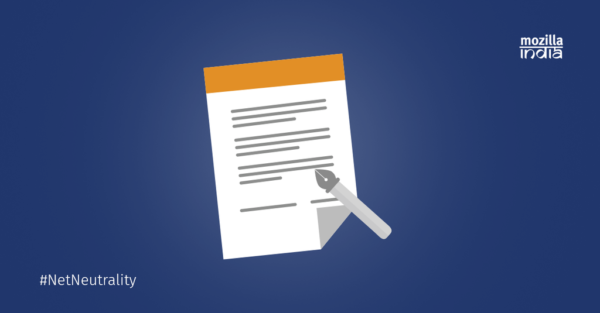
Millions of people in developing nations think that Facebook is the Internet. This is not a matter of mere confusion. It means that millions of people aren’t able to take advantage of all the things that the open, neutral Internet has to offer.
We’re committed to advancing net neutrality on a global scale. People around the world deserve access to the open Web: a Web ripe for exploration, education, and innovation. It’s especially critical to protect this right in countries where people are going online for the first time.
Mozilla’s entire community of open Web supporters is a demonstration of this commitment. Over one million Indians have mobilized through social media campaigns and on-the-ground efforts to “Save the Internet” and petition the Telecom Regulatory of India (TRAI). Indian Mozillians took a bold stand for net neutrality, because they care about freedom, choice, and innovation.
This week, Mozilla filed comments with TRAI. We’ve been engaged before with TRAI and the government of India on net neutrality, free data, and differential pricing. This time, we’re commenting on a pre-consultation paper on net neutrality. We are also contributing feedback on the Free Data consultation paper. This document asks for possible options that respect net neutrality while providing free data to users and complying with the Differential Pricing Regulation.
Our comments stress the need for a strong regulatory framework in India that ensures all internet traffic is treated equally, whether you’re a billion dollar company or a small startup. We also encourage the development of data-offering models that follow net neutrality principles:
- All points in the network should be able to connect with other points in the network
- Service providers should deliver all traffic from point to point as expeditiously as possible
- The Internet should remain a place for permissionless innovation.
We also articulate principles that define characteristics of equal-rating compliant models. We believe these principles will help TRAI and other regulators assess subsidized data offerings. Equal-rating means that offerings:
- Are content-agnostic – data offered is not limited to specific content or types of content
- Are not subject to gatekeepers – content doesn’t have to go through subjective or arbitrary processes to be included in the system
- Do not allow pay-for-play – data can’t be bought outright, which would privilege providers who have more purchasing power
- Are transparent – the terms are understandable and up-front for both end users and content providers
- Allow for user and content choice – users and content providers ultimately have the power to be included in, or excluded from, the system.
The Work Ahead
We applaud the Indian government for taking encouraging steps to protect the open Internet. TRAI’s consultation on net neutrality is a welcome step toward enshrining net neutrality in India. Still, connecting the unconnected remains one of the greatest challenges of our time. More work is needed to develop new, alternative models that offer the full diversity of the open Internet to everyone. We’ll continue to support the open Internet and net neutrality in India and around the world.
Join us in this effort by engaging on social media with #SaveTheInternet. Stay tuned to this blog for more on these issues. Share your opinion with the TRAI. There’s still time!













